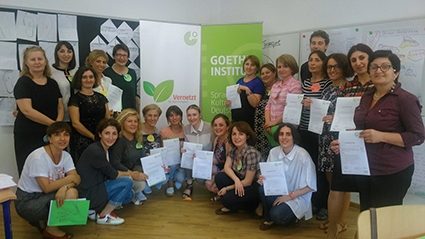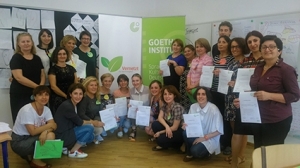Hildegard Kurt: Putting Sustainability into Language Lessons
German cultural scientist, sustainability researcher, author and co-founder of Berlin Art Institute Hildegard Kurt this week visited Tbilisi in the framework of the Goethe Institute’s large-scale project Unite for a Sustainable Future/ Vernetzt für Nachhaltigkeit. At the Institute she delivered hands-on educational-methodological seminars on environmental and green pedagogy as well as sustainable development.
Hildegard Kurt spoke to Georgia Today and explained her concept of culture and also expressed her amazement at the commitment of the Georgian teachers she had met.
“My work as a cultural researcher has been to explore the links between sustainability and culture. That means that the whole concept of sustainability is a cultural challenge. This is the question I have been exploring for the past fifteen years. Culture does not mean only going to a theatre or museum. It is about our values, attitudes, and how we can find values that help us stop destroying the planet and instead shape the economy, business, and school systems so that we can live on this planet peacefully without destroying each other and other beings. I am absolutely amazed how committed Georgian teachers are. I am amazed by the creativity they unfold in their work and with their pupils in order to give them a sense that each of them is an agent of change.”
The project aims to integrate environment protection and sustainable development during the time of German lessons in schools through the CLIL (Content and Language Integrated Learning) teaching method. It involves certain subjects e.g. social, humanitarian and natural sciences to be taught in a target foreign language. Prior to Hildegard Kurt’s visit, Vienna agricultural and environmental protection pedagogy graduates arrived in Georgia, bringing with them Austrian models of integrating environmental issues in German language lessons. They visited Akhaltsikhe, Kutaisi, Tbilisi, Rustavi, Vani and Zugdidi schools. The Austrian graduates entered classrooms along with Georgian teachers and gave practical-methodological seminars. They plan to assist the Goethe Institute to publish a handbook which will benefit future generations. The handbook will cover the teaching of both theoretical and practical aspects and will reflect specific methods for the educational process and describe the experiences of schools already involved in the project.
Eike Pockrandt, coordinator of the project at Goethe Institute in Georgia: “The project deals with combining language teaching with questions of sustainable development. Our teachers convey the idea of development and different directions of development to our children. Additionally, we are aiming for our teachers to improve the lessons in terms of sustainability. Even in language lessons, in this case German, one can teach sustainability. For instance, when you have a typical German breakfast you can talk about where the ingredients it consists of came from, what they do to the body, etc.- this is sustainability.”
The project was launched in spring, 2015 and is going to end in December. It is supported by the Ministry of Education and Science of Georgia, the Ministry of Environment and Natural Resources Protection of Georgia and is financed by the Foreign Affairs Ministry of the Federal Republic of Germany.
Meri Taliashvili












